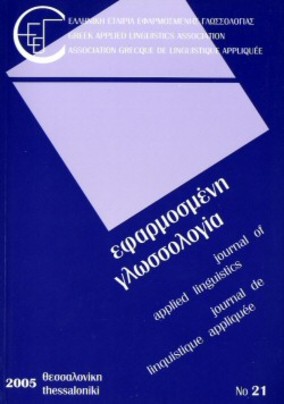On the problem of optionality in non-native English subject extraction
Part of : Εφαρμοσμένη γλωσσολογία ; No.28, 2013, pages 69-88
Issue:
Pages:
69-88
Author:
Abstract:
This paper considers the acquisition of subject extraction structures in the L2 grammar of Intermediate, Advanced and Very Advanced Greek learners of English. The results of the study show that these structures are associated with persistent acquisitional problems and that Greek learners, even proficient ones, transfer the corresponding LI properties in their L2 grammars. The paper discusses whether L2 acquisition theories based on the interpretability status of features can adequately explain such results and, generally, locate the areas that cause learnability problems in L2 acquisition. It is argued that accounts which associate learnability problems with syntactic, i.e. formal uninterpretable feature, differences between languages can have important implications not only for linguistic theory, but also for linguistic practice and teaching.
Subject (LC):
Notes:
Περιέχει πίνακες, γραφήματα, παράρτημα, σημειώσεις και βιβλιογραφία
References (1):
- Alexiadou, A. and E. Anagnostopoulou (1998). Parametrizing agr: word order, V-move-ment and EPP-checking. Natural Language and Linguistic Theory 16/3: 491-539.Anagnostopoulou, E. (1994). Clitic dependencies in Modern Greek. Unpublished Ph.DThesis, University of Salzburg, Austria.Barbosa, P. (1995). Null Subjects. Unpublished Ph.D Thesis, MIT.Barbosa, P. (2009). Two Kinds of subject Pro. Studia Linguistica 63: 2-58.Barbosa, P. (2011). Pro-drop and theories of pro in the Minimalist Program Part 1: Con-stistentnull subject languages and the pronominal-agr hypothesis. Language andLinguistic Compass 5: 551-570.Belletti, A., E. Bennati and A. Sorace (2007). Theoretical and developmental issues inthe syntax of subjects: evidence from near-native Italian. Natural Language and Linguistic Theory 25/4: 657-689.Chomsky, N. (1995). The Minimalist Program. Cambridge, MA: MIT Press.Chomsky, N. 2001. Derivation by phase. In M. Kenstowicz, (ed.), Ken Hale: A life inLanguage. Cambridge, MA: MIT Press, 1-52Duarte, M. E. L. (2000). The loss of the Avoid Pronoun principle in Brazilian Portuguese.In M. Kato and E. Negräo (eds), Brazilian Portuguese and the Null Subject Parameter.Frankfurt: Vernieri, 17-36.Iatridou, S. (1995). Clitics and island effects. Penn Working Papers in Linguistics 2:11-31.Kato, M. A. (1999). Strong pronouns, weak pronominals and the null subject parameter.Probus 11: 1-37.Kotzoglou, G. (2004). Subject extraction and the role of EPP checking. Cambridge Working Papers in Linguistics 2004: 356-363.Kotzo glou, G. (2005). Wh-extraction and locality in Greek. Unpublished PhD Thesis,University of Reading.Kotzoglou, G. (2007). The subject condition as a PF effect: Evidence from Greek. In E.Agathopoulou,M. Dimitrakopoulou, and D. Papadopoulou (eds), Selected Paperson Theoretical and Applied Linguistics: 17th International Symposium. Thessaloniki:Monochromia Publishing, 127-137.Kotzoglou, G. (2010). Non-Extraction from subjects as an edge phenomenon. In Ph.Panagiotidis (ed.), The Complementer Phase: Subjects and Wh-Dependencies. Oxford:Oxford University Press.Montrai, S., R. Diaz and H. Santos (2009). On some null subject parameter-relatedpropertiesin the L3 acquisition of Brazilian Portuguese. Estudos da Lingua(gem)Vitoria da Conquista 7: 199-232.Negräo, E. and E. Viotti (2000). Brazilian Portuguese as a discourse oriented language.In M. Kato and E. Negräo (eds), Brazilian Portuguese and the Null Subject Parameter.Frankfurt: Verveuert-Iberoamericana, 105-125.Pesetsky, D. (1987). Wh-in situ: Movement and unselective binding. In E. Reuland, E.and A. Ter Meulen (eds). The Representation of (In)definiteness. Cambridge MA:MIT Press, 103-133.Prentza, A. and EM. Tsimpli (2013). The interpretability of features in second languageacquisition: Evidence from null and postverbal subjects in L2 English. Journal ofGreek Linguistics 13: 323-365.Platzack, C. (2004). Agreement and the person phrase hypothesis. Working Papers inScandinavian Syntax 73: 83-112. Lund University.Rizzi, L. and U. Shlonsky (2007). Strategies of subject extraction. In U. Sauerland, andFl.M. Gärtner (eds), Intetfaces + Recursion = Language. Berlin and New York: Mouton de Gruyter, 115-160.Roussou, A. (2002). C, T and the subject: That-t phenomena revisited. Lingua 112/1:13-52.Roussou, A. and I-M. Tsimpli. (2006): On Greek VSO again!Journal of Linguistics 42/1:317-354.Sorace, A. (1993). Incomplete and divergent representations of unaccusativity in nonnative grammars of Italian. Second Language Research 2/1: 22-48.Sorace, A. (2000). Gradients in auxiliary selection with intransitive verbs. Language,76/4: 859-890.Sorace, A. (2005). Selective optionality in language development. In L. Cornips, and K.Corrigan (eds), Biolinguistic and Sociolinguistic Accounts of Variation. Amsterdam:John Benjamins, 55-80.Spyropoulos, V. and I. Philippaki-Warburton (2001). Subject and EPP in Greek: Thediscontinuous subject hypothesis. Journal of Greek Linguistics, 2:149-186.Tsimpli, I.M. (1997). Resumptive features and minimalism: Evidence from second language acquisition. In Proceedings of the 21 s1 Annual Boston University Conference onLanguage development. 21: 639-655.Tsimpli, I.M. (2005). Variation in the L2 speaker. In K. Brown (ed.). Encyclopaedia ofLanguage and Linguistics: Volume 13. 2 nd edition. Oxford: Elsevier, 387-394.Tsimpli, I.M. (2006). Variation in second language acquisition. In Encyclopaedia of Language and Linguistics, 2nd Edition, 387-394.Tsimpli, I.M. and M. Dimitrakopoulou (2007). The Interpretability Hypothesis: Evidence from wh-interrogatives in second language acquisition. Second Language Research 23/2: 215-242.Tsimpli, I.M. and M. Mastropavlou (2007). Feature interpretability in L2 acquisitionand SLI: Greek clitics and determiners. In J. Liceras, H. Zobl and H. Goodluck (eds),The Role of Formal Features in Second Language Acquisition. Mahwah, NJ: LawrenceErlbaum, 143-183.Tsimpli, I.M. and A. Roussou (1991). Parameter-Resetting in L2? In UCL Working Papers in Linguistics 3: 149-169.White, L. ( 1986). Implications of parametric variation for adult second language acquisition: An investigation of the pro-drop parameter. In V. Cook (ed.), ExperimentalApproaches to Second Language Learning. Oxford: Pergamon Press.




